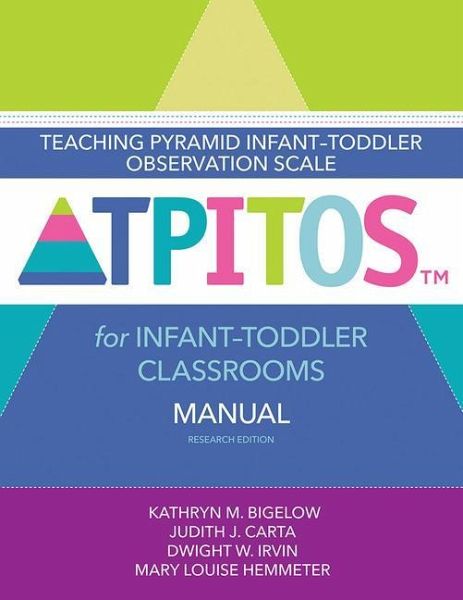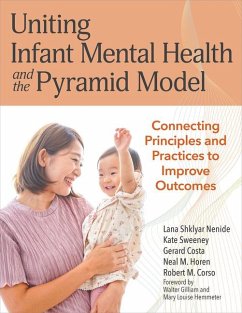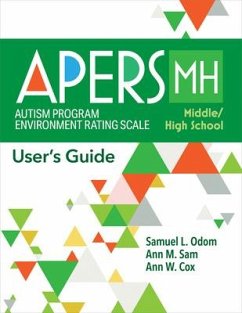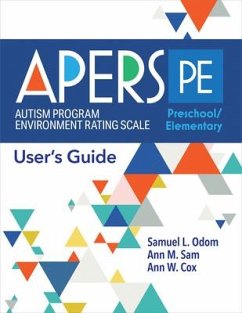Nicht lieferbar

Teaching Pyramid Infant-Toddler Observation Scale (Tpitos(tm)) for Infant-Toddler Classrooms Manual, Research Edition
Versandkostenfrei!
Nicht lieferbar




Modelled after the Teaching Pyramid Observation Tool (TPOT), The Pyramid Infant Toddler Observation Scale (TPITOS) is an assessment instrument designed to measure the fidelity of implementation of Pyramid Model practices in infant and toddler (birth to three) care settings.
Kathryn Bigelow, Ph.D., is an Assistant Research Professor at the Juniper Gardens Children's Project in the Institute for Life Span Studies at the University of Kansas. Her research focuses on interventions for culturally and linguistically diverse children and families experiencing multiple risks. Specifically, her work has addressed early childhood language and social-emotional development and the translation of evidence-based interventions for parents, care providers, home visitors, and early intervention providers within both center-based and home-based early childhood education programs. Dr. Bigelow's work in these areas maintains an emphasis on implementation fidelity, and how technology can promote engagement and enhance the implementation of evidence-based intervention. She has been the PI or Co-PI on projects focusing on child language promotion, and on parent engagement in home visiting. Currently, she directs, with Drs. Carta, Irvin, and Hemmeter, an Institute of Education Sciences-funded (IES) research project focused on developing the Infant-Toddler Pyramid Model, a three-tiered model to promote social-emotional outcomes for infants and toddlers, based on the TPITOS. Judith J. Carta, Ph.D., is a Senior Scientist in the Institute for Life Span Studies, Professor of Special Education, and the Interim Director of the Juniper Gardens Children's Project at the University of Kansas. Her research focuses on developing strategies to minimize the effects of poverty on children's outcomes, designing practices that teachers and parents can use to promote children's early learning and social-emotional development, methods for monitoring the progress of young children, and strategies for promoting family engagement in early intervention programs. She has been the PI of several multi-site research projects and centers funded by the National Institutes of Health, the Institute of Educational Sciences, and the Administration on Children and Families. She currently co-directs an IES-funded project to develop the Infant-Toddler Pyramid Model, a three-tiered model to promote social-emotional outcomes for infants and toddlers, based on the TPITOS. She was a member of the Federal Advisory Panel on Head Start Research and Evaluation, Division of Early Childhood’s Commission on Recommended Practices, and served as the Editor of Topics in Early Childhood Special Education as well as the boards of numerous scientific journals. She received the Mary E. McEvoy Service to the Field Award from the Division for Early Childhood. Dwight W. Irvin, Ph.D., is an Assistant Research Professor in the Life Span Institute at the University of Kansas Medical Center. He was a Response to Intervention (RTI) in Early Childhood Postdoctoral Fellow at Juniper Gardens Children's Project and a Postdoctoral Scholar in Department of Education Leadership at the University of Kentucky. His research focuses on the use of wearable sensors to better understand the link between adult-child and child-peer interactions and the social competence of young children at-risk for or with identified disabilities in the classroom, home and community. Mary Louise Hemmeter, Ph.D., is a professor in the Department of Special Education at Vanderbilt University. She teaches courses, advises students, and conducts research on early childhood issues. She is the cofaculty director of the Susan Gray School for Children, which is an early childhood program for children with and without disabilities. Her research focuses on effective instruction, social-emotional development and challenging behavior, translating research to practice, and effective approaches to professional development. Currently, she directs an Institute of Education Sciences–funded research project focused on the efficacy of implementing the Teaching Pyramid in classrooms, and she works on the National Center on Quality Teaching and Learning and the Office of Special Education Programs–funded Technical Assistance Center on Social Emotional Interventions. She is a coeditor of the Journal of Early Intervention and serves on the editorial boards of other major journals in early childhood special education. She served as President of the Council for Exceptional Children's Division for Early Childhood (DEC) and received the Merle B. Karnes award from DEC.
Produktdetails
- Verlag: Brookes Publishing Company
- Erscheinungstermin: 3. Oktober 2018
- Englisch
- Abmessung: 277mm x 213mm x 8mm
- Gewicht: 295g
- ISBN-13: 9781681252421
- ISBN-10: 1681252422
- Artikelnr.: 52524033
Herstellerkennzeichnung
Libri GmbH
Europaallee 1
36244 Bad Hersfeld
gpsr@libri.de
Für dieses Produkt wurde noch keine Bewertung abgegeben. Wir würden uns sehr freuen, wenn du die erste Bewertung schreibst!
Eine Bewertung schreiben
Eine Bewertung schreiben
Andere Kunden interessierten sich für










